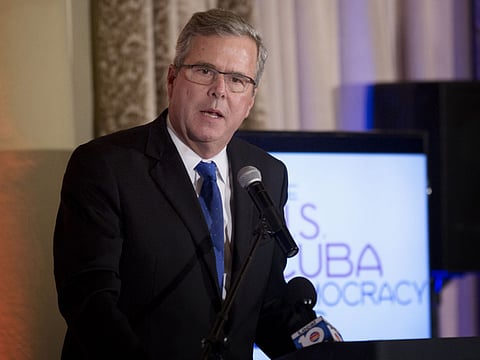The US presidential poll paradigm
Main Street stagnation and terrorism are the big issues for 2016

The new trend in US politics is stealing each other’s clothes. Given how polarised America has become, there is a remarkable consensus on the main topics of debate.
After years of ignoring it, Republicans are suddenly worried about the middle-class squeeze, as though it came to light in the last quarter. Liberals have been focusing on Joe Sixpack’s woes for more than a decade. Democrats, meanwhile, are once again nervous of the terrorist menace — an unwavering conservative talking point since 2001. Each rejects the other’s biases. But they are looking at the same menu. Main Street stagnation and terrorism are the big issues on which the 2016 race is unfolding.
Though other events will intrude, neither will easily be toppled. The massacre at the Paris offices of Charlie Hebdo was the latest in an apparently escalating line of atrocities reminding the US voter that Al Qaida and its offshoots outlived Osama Bin Laden. It followed the Taliban’s slaughter of 148 school children in Peshawar, the staged beheadings in Syria by Daesh (Islamic State of Iraq and the Levant) and a hardening perception that the death cult is spreading.
For the first time since 2009, US voters cite terrorism as America’s top priority (76 per cent), according to a Pew poll last week. Given the tenacity of the gains of Daesh in Syria and Iraq — it has held its ground in spite of US air strikes — and Al Qaida’s strong advances in Yemen and beyond, it is hard to imagine this will change in 2015. Though it never vanished, terrorism is centre stage again.
The immediate US impact is among Republican White House hopefuls. Only one contender, Rand Paul — the artist formerly known as isolationist, also a senator from Kentucky — diverges from his party’s muscular line on national security. The more crowded the Republican field, the more Paul stands out. In one sense, this is a real selling point. There are plenty of millennial libertarians out there. But it also makes Paul an increasingly juicy target. He is adjusting rapidly. In the past year, he has gone from being an isolationist to a “non-interventionist” and is now a foreign policy “realist”. At this rate, he will be a neoconservative before Independence Day.
The other barometer is Hillary Clinton. The former secretary of state has the strongest name brand in US politics — even more so than Jeb Bush. But Republicans will still try to link her with President Barack Obama’s perceived foreign policy weaknesses.
Paul now describes the chaos in Libya as “Hillary Clinton’s war” — she was secretary of state when the US helped arrange the Anglo-French toppling of Muammar Gaddafi. She was still in that job when the US ambassador to Libya and other American citizens were killed by terrorists in Benghazi. In a speech last month, Hillary said the US should “empathise” with its enemies. Though her remark was taken out of context, Republicans seized on it to paint her as soft on terrorists. Among Democrats, Hillary is seen as relatively hawkish. Republicans will push her even more in that direction if and when she declares her intentions.
Nor is middle-class angst about to go away. The most striking thing about the recovery is how much poorer most Americans are since it began. The median income is still 8 per cent below where it was in 2007 and more than 5 per cent lower than at the start of the recovery in 2009.
Some economists believe that 2015 will be the year when some of America’s aggregate growth trickles down into Joe Sixpack’s paycheque. There is precious little sign of that so far. In December, the average weekly wage shrank from where it was a year earlier. Most Americans do not see their financial prospects improving over the next year.
Again, the Republican 2016 race offers the best take on this. Ten days ago, Mitt Romney, the losing Republican nominee in 2012, let it be known that he still “wants to be president”. Rarely has a phoenix been so quickly reburied.
Republican horror at the prospect of a Romney re-run was only partly about the fact that he has already had his chance. It was also about the manner in which he flunked it. Few will forget Romney’s offhand remark that 47 per cent of Americans were “takers” (spongers), a phrase borrowed from Ayn Rand, the cultish philosopher of small government. That, and Romney’s plutocratic sheen, put a bit of a dampener on the blue collar vote.
Bush, the most dynastic name in the Republican field, has clearly absorbed that lesson. Jeb’s funding vehicle is called Right to Rise in reference to declining US economic mobility. In his acceptance speech as Republican speaker of the House of Representatives this month, John Boehner spoke about the urgent need to reverse the US “middle-class squeeze”. As yet, there are few conservative solutions to the middle-income effects of globalisation and technology. Approving new oil pipelines and abolishing Obamacare are not likely to convince many people. Nor have Republicans acknowledged rising inequality. But they have at least updated their vocabulary.
Hillary, meanwhile, is a bit of a plutocrat herself. She may also be more vulnerable on national security than is assumed. Yet, she is nothing if not highly skilled at synthesising where things stand. Expect Joe’s pain and the terrorist menace to be at the heart of her launch message.
— Financial Times


